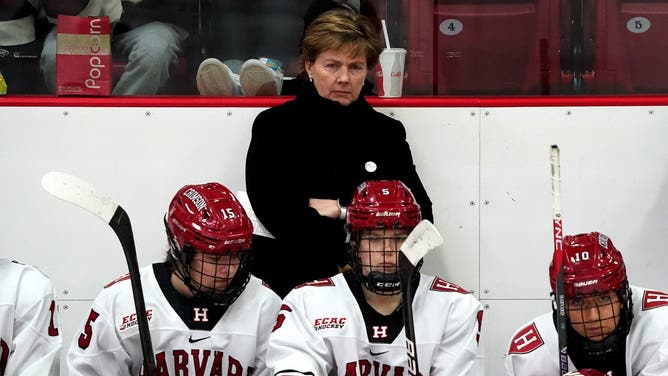Former Harvard Coach Katey Stone Was Tough On Her Players, So What? | Dan Zaksheske
As OutKick reported on Tuesday, legendary former Harvard women's hockey coach Katey Stone is suing the school for gender discrimination.
Stone alleges that she was treated differently relative to her male counterparts when it came to both pay and treatment.
Two Harvard players, essentially, led a coup against Stone after the coach used the phrase "too many chiefs and not enough Indians" when talking about her team in the locker room.
But it seems, based on available information, that these players already did not like Stone and found an excuse to try and oust her from her position.
Ultimately, it worked. The school, according to Stone, forced her to retire in 2023 amid allegations that she ran a program steeped in abuse.

Former Harvard women's hockey coach Katey Stone became the first female head coach of Team USA women's hockey in 2014.
(Winslow Townson/USA TODAY Sports)
A 2023 Boston Globe article was a major catalyst; the headline "'A culture of complete fear’: Harvard women’s hockey coach Katey Stone under fire for alleged abusive behavior" painted a terrible picture of Stone.
Except, there is so much more to the story.
Most importantly, so many of Stone's former players have come out in staunch defense of their former hockey coach.
On Tuesday, Stone held a press conference with three of those players. They all became emotional when talking glowingly about Stone.
But there was also one important theme throughout: Stone was a tough coach who demanded excellence.
Former Harvard women's hockey players spoke out in defense of Coach Katey Stone.
"[Stone]… pushed me through the hard moments, asked a lot of me, and she built up my strength and my resilience," Kalley Armstrong said of Stone. "She has been truly instrumental in shaping my life and helping me become the best version of myself."
"Coach Stone emphasized the values of discipline, hard work, accountability, leadership and unselfishness," Nicole Corriero said. "This was manifested in ensuring we came to practice or training ready to put in our fullest effort, not just for our own personal betterment, but for the betterment of those around us."
"She challenged me to be the best version of myself. Days when it was harder than others, days when I wasn’t sure I could do it, she knew. She knew I had it in me, she knew we all had it in us," Jamie Hagerman Phinney added.
"I cannot speak for anyone else, but what I know as my hard and fast truth is that had Katey Stone not pushed me, not asked for more, not asked for my best, especially when I doubted myself, I would never have become the teacher, coach, mom, friend, wife, teammate I am today."

Former Harvard women’s ice hockey coach Katey Stone spoke at a press conference, along with several of her former players.
(Suzanne Kreiter/The Boston Globe via Getty Images)
"[My players] face tremendous competition, complex challenges, and simple yet unrelenting adversity. I have told my teams for years: ‘Ask more of yourselves and you will get more,’" Stone said at the press conference.
"The culture of Harvard Women’s Hockey is an ‘earn it,’ not an entitlement mentality. This enduring core value has been both our foundation and our edge."
Stone's demanding style allowed her to have a storied 29-year career that resulted in her being the winningest female coach in women's college hockey history.
She was a pioneer, becoming the first female head coach in the history of Team USA women's hockey, leading the team to a silver medal at the 2014 Winter Olympics.
Yet, it was her tough style that ultimately led to the media and the school destroying her reputation and forcing her into an early retirement.
Harvard, which constantly preaches equality, did not practice equality when it came to their women's hockey coach.
"Where… Harvard permits, if not openly encourages, male coaches to use their discretion in how best to coach and motivate the players on their respective teams, Coach Stone was harshly punished and excoriated for engaging in the same coaching strategies and behaviors," Stone's complaint against Harvard alleges.
Herein lies the main issue. Harvard, a bastion of DEI in America that constantly preaches about equality, didn't believe that a female coach should be tough on female players.
But they had no problem with their men's coaches engaging in the same behaviors towards male athletes.
See, the people who yell the loudest about racism, sexism, etc. are often the ones who engage in those behaviors most.
Harvard, and the media that wrote negative articles about Stone, showed that they believed these female athletes weren't equipped to handle tough coaching. Certainly, not as equipped as male athletes.
That sounds pretty sexist, doesn't it?

Former Harvard women's hockey coach Katey Stone was a tough coach during her 29-year career, but do people think female athletes can't handle that?
(Barry Chin/The Boston Globe via Getty Images)
It's also untrue. Just look at the former players who have come out to defend Stone. They appreciated her style and all of them said it made them better people.
Armstrong now runs a hockey training program for young, Indigenous Canadian hockey players. Corriero is a partner at a law firm in Canada. Phinney is a teacher, counselor and hockey coach at a prestigious boarding school.
All three of those women attribute part of their success in life to Coach Stone and her coaching style.
Katey Stone also alleges that Harvard underpaid her relative to the men's hockey coach. They told her that he "has to make quicker in-game decisions."
So, again, Harvard preaches about equality but apparently doesn't even practice it within its own athletics department.
That's the main issue here. This is not exclusive to Harvard, but is frequently what you find when you dig into institutions, corporations and people who scream the loudest about "justice" and "inequality."
Coach Stone was tough on her players. So what?
Those women are just equipped to handle it as their male counterparts, and they're better for it in the short-term and the long-term.
Don't listen to the "anti-sexists" who try to tell you any differently.